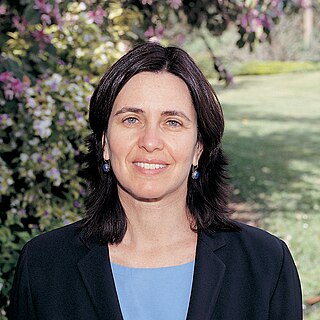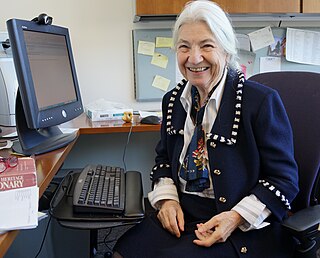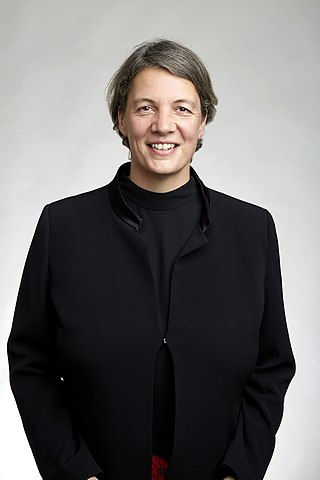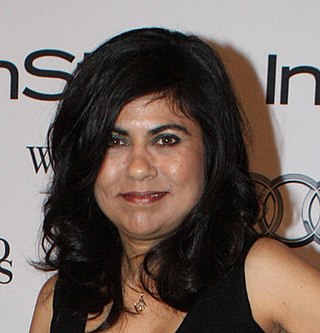Related Research Articles

Shafrira Goldwasser is an Israeli-American computer scientist. A winner of the Turing Award in 2012, she is the RSA Professor of Electrical Engineering and Computer Science at the Massachusetts Institute of Technology; a professor of mathematical sciences at the Weizmann Institute of Science; the director of the Simons Institute for the Theory of Computing at the University of California, Berkeley; and co-founder and chief scientist of Duality Technologies.
The Australian Research Council (ARC) is the primary non-medical research funding agency of the Australian Government, distributing more than A$800 million in grants each year. The Council was established by the Australian Research Council Act 2001, and provides competitive research funding to academics and researchers at Australian universities. Most health and medical research in Australia is funded by the more specialised National Health and Medical Research Council (NHMRC), which operates under a separate budget.

Willy Susilo is an Australian cybersecurity scientist and cryptographer. He is a Distinguished Professor at the School of Computing and Information Technology, Faculty of Engineering and Information Sciences University of Wollongong, Australia.

Ruzena Bajcsy is an American engineer and computer scientist who specializes in robotics. She is professor of electrical engineering and computer sciences at the University of California, Berkeley, where she is also director emerita of CITRIS.

Genevieve Bell is the Vice-Chancellor of the Australian National University and an Australian cultural anthropologist. She is best known for her work at the intersection of cultural practice research and technological development, and for being an industry pioneer of the user experience field. Bell was the inaugural director of the Autonomy, Agency and Assurance Innovation Institute (3Ai), which was co-founded by the Australian National University (ANU) and CSIRO’s Data61, and a Distinguished Professor of the ANU College of Engineering, Computing and Cybernetics. From 2021 to December 2023, she was the inaugural Director of the new ANU School of Cybernetics. She also holds the university's Florence Violet McKenzie Chair, and is the first SRI International Engelbart Distinguished Fellow. Bell is also a Senior Fellow and Vice President at Intel. She is widely published, and holds 13 patents.

Michelle Yvonne Simmons is an Australian quantum physicist, recognised for her foundational contributions to the field of atomic electronics.

Veena Sahajwalla is an inventor and Professor of Materials Science in the Faculty of Science at UNSW Australia. She is the Director of the UNSW SM@RT Centre for Sustainable Materials Research and Technology and an Australian Research Council Laureate Fellow.

Fei-Fei Li is a Chinese-American computer scientist, known for establishing ImageNet, the dataset that enabled rapid advances in computer vision in the 2010s. She is the Sequoia Capital professor of computer science at Stanford University and former board director at Twitter. Li is a co-director of the Stanford Institute for Human-Centered Artificial Intelligence and a co-director of the Stanford Vision and Learning Lab. She served as the director of the Stanford Artificial Intelligence Laboratory from 2013 to 2018.
Mary Josephine O'Kane, AC an Australian scientist and engineer, is the Chair of the Independent Planning Commission of New South Wales. She is also a company director and Executive Chairman of O’Kane Associates, a Sydney-based consulting practice specialising in government reviews and research and innovation advice to governments in Europe, Asia and Australasia.
Svetha Venkatesh is one of the top 15 women in the world in Artificial Intelligence. She is Indian/Australian and is an Alfred Deakin Professor in the Faculty of Science, Engineering & Built Environments, in the Department of Pattern Recognition and Data Analytics at Deakin University, as well as a professor of computer science and director of the Centre for Pattern Recognition and Data Analytics (PRaDA) at Deakin. She was elected a Fellow of the International Association of Pattern Recognition in 2004 for her contributions to the "formulation and extraction of semantics in multimedia data". She was also elected a Fellow of the Australian Academy of Technological Sciences and Engineering in 2006 and an ARC Laureate Fellow in June 2017. She was elected a Fellow of the Australian Academy of Science in May 2021.
Marcela Bilek is a Professor of Applied Physics and Surface Engineering at the University of Sydney, Australia. Her research interests focus on the use of plasma related methods to synthesise thin film materials and modify surfaces and interfaces. She was named Fellow of the American Physical Society in 2012 and Fellow of the Institute of Electrical and Electronics Engineers (IEEE) in 2015 for contributions to the science and application of plasma processes for materials modification and synthesis.
Karu P. Esselle is an Australian scholar, professor, engineer, scientist and inventor. He is the Distinguished Professor in Electromagnetic and Antenna Engineering at University of Technology Sydney, Australia. He is the leader of the MetaSteerers Team, which won Australia's national 2023 Department of Defence Eureka Prize for Outstanding Science in Safeguarding Australia. He was named Australia's Professional Engineer of the Year for 2022 by Engineers Australia - the national body that oversees engineering practice and profession in Australia. Eureka prizes are considered the Oscars of Australian Science. He is also a visiting professor of electronic engineering at Macquarie University in Sydney, Australia.
Weisong Shi is a computer scientist, known for his leadership in fostering the edge computing research community. He is currently an Alumni Distinguished Professor and Department Chair of Computer and Information Sciences at University of Delaware in Newark, Delaware, where he leads the Connected and Autonomous Research (CAR) Laboratory. He is an internationally renowned expert in Edge Computing and Autonomous Vehicles. He was named a Fellow of the Institute of Electrical and Electronics Engineers (IEEE) in 2016 for his contributions to distributed systems and Internet computing. He is the Editor-in-Chief of IEEE Internet Computing Magazine and the inaugural Editor-in-Chief of Elsevier Smart Health Journal.

Professor Branka Vucetic is an Australian-based expert in coding theory and its applications in wireless technology. She works at the University of Sydney where she holds the positions of ARC Laureate Fellow, Peter Nicol Russell Chair in Telecommunications, and Director of the Centre of Excellence in Telecommunications.
Kourosh Kalantar-zadeh is an Australian scientist involved in research in the fields of materials sciences, electronics, and transducers. He is best known for his works on two-dimensional semiconductors, ingestible sensors and liquid metals. He led his group to the invention of an ingestible chemical sensor: human gas sensing capsule.

Mary-Anne Williams FTSE is the Michael J Crouch Chair for Innovation at the University of New South Wales in Sydney Australia (UNSW), based in the UNSW Business School.
The Australian Laureate Fellowship is an Australian professorial research fellowship awarded by the Australian Research Council. Fellows are chosen each year for five-year awards. In 2023 8 industry-focused Laureate Fellowships were awarded for the first time.
Arun Sharma is an Indian Australian computer science professor. He is a distinguished emeritus professor at the Queensland University of Technology (QUT) where he was the Deputy Vice-Chancellor for Research and Commercialisation from 2004 to 2019. He is the Council Chair of the QIMR Berghofer Medical Research Institute. Within the multinational Adani Group, he is also an Advisor to the Chairman and Group Head for Sustainability and Climate Change. He was a cofounder of Australia's National ICT Research Centre of Excellence (NICTA), and Director of the Translational Research Institute (Australia). In the course of his institutional duties, Sharma played a significant role in the development of Australian technology research capability, the promotion of translational research in agriculture and biosciences within Queensland, and the fostering of international technological research cooperation between Australia and India. Sharma's professional achievements have been recognized by awards by the Premier of Queensland, the Office of the Chief Scientist (Australia), the India Australia Business & Community Awards (IABCA), the Birla Institute of Technology & Science, and the Royal Order of Australia. He was born in the town of Banmankhi in the Indian state of Bihar.

Sarah Pink is a British-born social scientist, ethnographer and social anthropologist, now based in Australia, known for her work using visual research methods such as photography, images, video and other media for ethnographic research in digital media and new technologies. She has an international reputation for her work in visual ethnography and her book Doing Visual Ethnography, first published in 2001 and now in its 4th edition, is used in anthropology, sociology, cultural studies, photographic studies and media studies. She has designed or undertaken ethnographic research in UK, Spain, Australia, Sweden, Brazil and Indonesia.
Jane Patricia Hall is an Australian academic, professor of Health Economics in the Business School and Faculty of Health, University of Technology Sydney, NSW Australia. Hall is a Fellow of the Academy of Social Sciences in Australia, and a Fellow of the Australian Academy of Health and Medical Sciences.
References
- 1 2 "Jie Lu Profile". University of Technology Sydney. Retrieved 10 November 2023.
- ↑ "Jie Lu". IEEE Xplore. Retrieved 10 November 2023.
- ↑ "Jie LU (FIEEE, FIFSA)". scholar.google.es. Retrieved 13 May 2021.
- ↑ Council, Australian Research (25 June 2019). "2019 Laureate Profile: Professor Jie Lu". www.arc.gov.au. Retrieved 13 May 2021.
- ↑ "Distinguished Professor Jie LU". It's an Honour. 26 January 2023. Retrieved 1 February 2023.